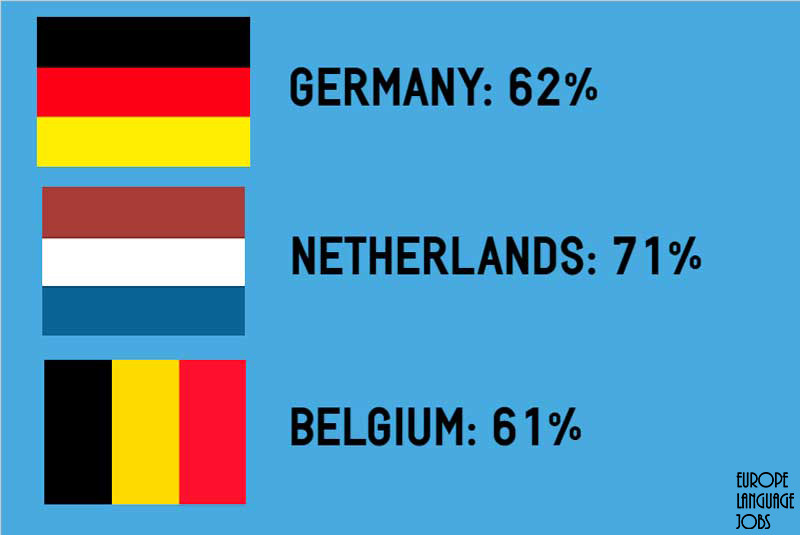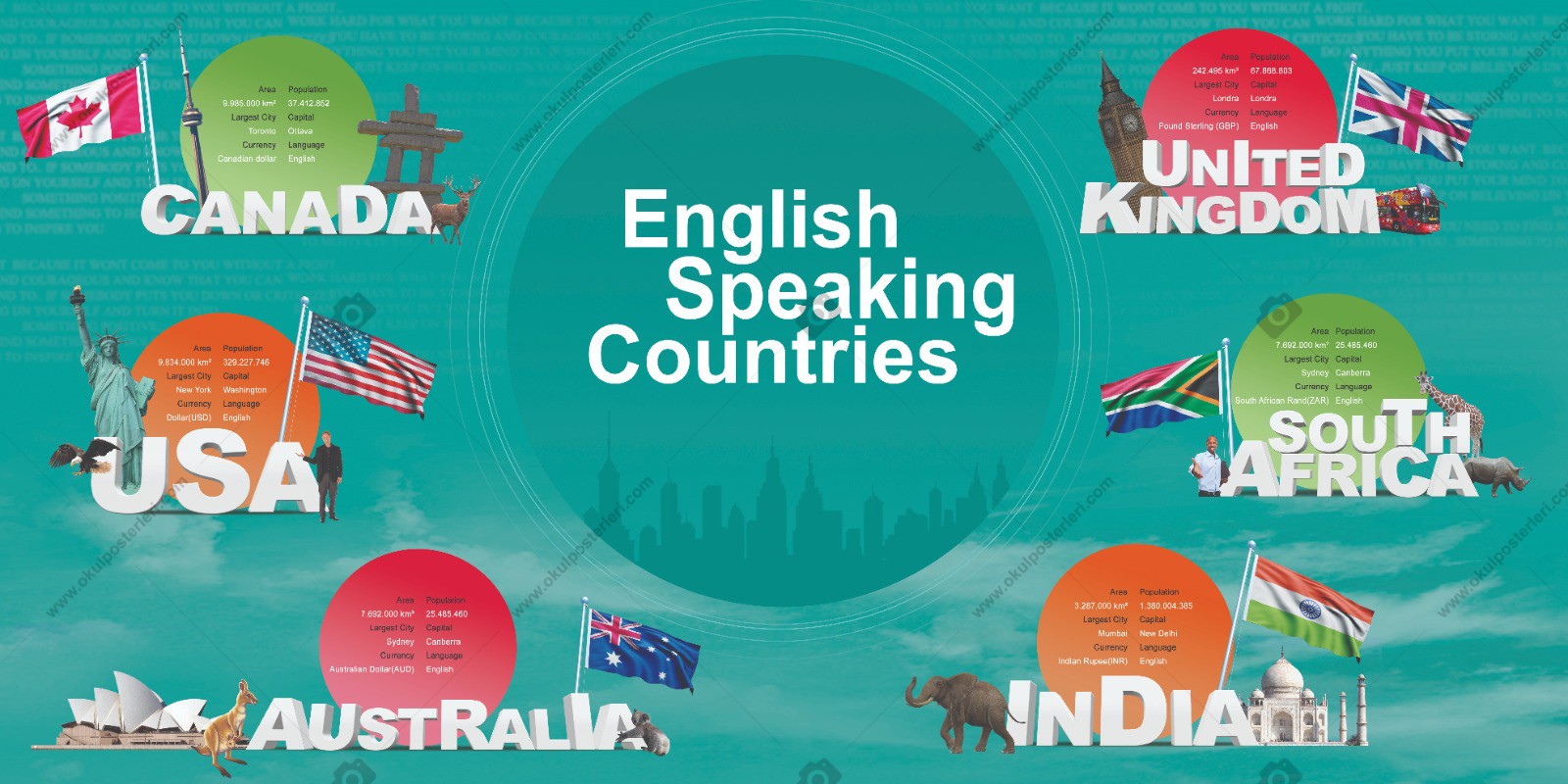As in the Caribbean, a number of African countries have English as an official language because of colonialism. In all of Africa — a population of about 1.2 billion — only 6.5 million people speak English as their native language. But following the pattern of a number of other continents, a number of Africans have learned English as a second language.
How Many Countries Speak Only English Around 237 million people in Africa speak English in total (including native and non-native speakers). The English language originated in Britain and the ever-expanding British Empire spread Modern English around the world during the 18th and 19th centuries. This is why many of the countries where English is an official language were former British colonies, including Canada, Australia, South Africa and the United States. Although Hindi is the most widely-spoken language in India today, English remains an official language in the country and is often used in university education, and within the field of politics. Officially, just 12% of Indian people speak English, with many only speaking it as a second language. Nevertheless, the country has an extremely dense population, meaning that this 12% cross-section of society exceeds 100 million people.
As a result, India has one of the largest English-speaking populations on the planet. People often call English the international language of business, and it's increasingly true as international trade expands every year, bringing new countries into contact. Many of the best MBA programs are taught in English, so speaking it well can put you in a position to get the best training and credentials. Most multinational companies require a certain degree of English proficiency from potential employees so in order to get a position with a top company, more and people are learning English.
With a population of 31 million, the official language and the lingua franca is English. Approximately, people speak 11 languages in Ghana, but English remains the language of business and formal communication. English is the official language of the country housing a population of 18 million.
Zambia has several indigenous languages, and almost all of them belong to the Bantu family of languages. For business and official correspondence in the region, people speak English in Zambia. South Africa, for example, has 11 different official languages, and even more languages and dialects are spoken in the country. Though English is listed as an official language in these countries, many people may not speak English.
In Namibia, for example, only 7% of the population speaks English, even though it is the only official language. Despite having two different official languages, Canada has the third largest English-speaking population, with somewhere in the region of 20 million native speakers, while Australia is next in the list, with around 17 million. If you want to study in English in Singapore, the good news is that English is one of its official languages, with around 80 percent of the population fluent, and it's also the official language of instruction at universities. However, costs in Singapore are relatively high – as an example, undergraduate tuition fees at NUS started at S$17,550 (~US$13,000) in 2018, and the high standard of living is matched by high living costs. Located in the Central part of Africa, Rwanda is one of the smallest countries in the African continent. Having a population of only 13 million, the country has only 0.2% of the population which speaks English.
It is the third official language in the country, after Kinyarwanda and Swahili. While English is the language of business correspondence, Kinyarwanda remains the most widely spoken and national language in the region. Located in the Southern part of Africa, this country ranks as the second-best English speaking country in the African continent. The country has 11 official languages and people speak other languages in the region as well, including Afrikaans and IsiZulu. The largest English speaking countries are located in North America--the United States and Canada.
Although English and French are both the official languages in Canada, fully 85 percent of that country's population speaks English. In addition to the US and Canada, several Caribbean countries speak English. These are primarily the countries that were colonized by England, and include Antigua and Barbuda, the Bahamas, Barbados, Jamaica, Grenada, and the Turks and Caicos Islands. Bermuda, still a part of Great Britain, speaks primarily English as does the tiny, Central American country of Belize. The European Union is a supranational union composed of 27 member states. Often in America such people are the children of immigrants; these children grow up speaking their parents' native language in their childhood home while speaking English at school.
Many bilinguals, however, are not immigrants; it is not uncommon for people born in the U.S. to speak English at school or work and another language at home. Children can also become bilingual if their parents speak more than one language to them, or if some other significant person in their life speaks to them consistently in another language. Sometimes a child will grow up in a household in which each parent speaks a different language; in that case, the child may learn to speak to each parent in that parent's language. In short, a young child who is regularly exposed to two languages from an early age will most likely become a fluent native speaker of both languages.
The region with the least Spanish speakers, Asia has hosted the Spanish language since the sixteenth century, when Spanish explorers colonized the Philippines and set about imposing their rule and spreading Christianity. Here, Spanish was spoken primarily by the elite – businesspeople, intellectuals, missionaries and the local court. Briefly in 1973, then finally in 1987, Spanish lost its title as the Philippines' official language. And as we speak, many more people are intrigued by the idea of learning Spanish and what it can do for them while traveling, working, or just living life. Before a company introduces a global English policy, leaders should make a persuasive case for why it matters to employees and the organization. Employees must be assured that they will be supported in building their language skills.
Companywide cultural-awareness training will help nonnative speakers feel heard and valued. Leaders should rally workers behind using English to accomplish goals, rather than learn it to meet proficiency standards. This is another country with a high percentage of English speakers.
Higher education is free for Austrian nationals and students from the EU. Students from non-EU countries can expect to pay €726.72 (~US$815) per semester. Compare that with continental Europe, where multilingualism is the rule rather than the exception. More than half of EU citizens are bilingual, and not just because they live in countries like Luxembourg with multiple official languages. Even in France, which has only one official language and is immensely proud of its linguistic heritage, most people speak a second language.
More than 300 million people speak French on the five continents. The OIF, an international organisation of French-speaking countries, comprises 88 member States and governments. French is the second most widely learned foreign language after English, and the fifth most widely spoken language in the world. Located in the Southeastern part of Africa, Malawi has a population of 19 million. Although English is the official language of the country, only 26% of the population can speak it.
Chichewa is the national language of Malawi and 57% of the population speaks it. Other prominent languages in the region include Chinyanja, Chiyao, and Chitumbuka. It might come as a surprise, but even though only 5% of the total population speaks English as a native language in Zimbabwe, almost 89% of the total population can speak it fluently. This number of speakers comes second only to Seychelles (93%) among the African countries. In addition, English is the lingua franca of the country, while the main language is Shona, spoken by 70% of the population. This East African nation ranks fourth in the list of best English speaking countries in Africa.
With a population of 54 million, this country houses various ethnic groups, all of which speak their own languages. However, the official language of Kenya is English and about 2.7 million people speak and understand English here. The list presented here comes from the CIA World Factbook, a widely recognized source of data on countries around the globe.
The table below lists the official language of each country, if there is one, as well as other languages spoken. In selected countries, the percent of the population that speaks each language is also given. This covers all of the major recognized languages in each country. You can add No 8 South Africa to your list of expat countries to live and where English is widely spoken, even though there are 10 more official languages spoken here. But if you don't mind a bit of crime now and then, South Africa can be a popular destination to spend some time. You only need to get out when it gets a little too hot to handle.
Now that you know just how many countries speak English, it is time to practice your own English! Hopefully this list will help motivate you to study, since knowing the language can open doors to travel to many, many different countries around the world. There are a lot of people learning to speak English, so you are in good company as you practice speaking and reading English and get ready to add it to your daily life.
English language, West Germanic language of the Indo-European language family that is closely related to the Frisian, German, and Dutch languages. English originated in England and is the dominant language of the United States, the United Kingdom, Canada, Australia, Ireland, New Zealand, and various island nations in the Caribbean Sea and the Pacific Ocean. It is also an official language of India, the Philippines, Singapore, and many countries in sub-Saharan Africa, including South Africa.
English is the first choice of foreign language in most other countries of the world, and it is that status that has given it the position of a global lingua franca. It is estimated that about a third of the world's population, some two billion persons, now use English. While many foreigners who live in Spain do speak English, most locals don't at all.
You will encounter English-speaking people in big tourist cities such as Madrid, Barcelona, Malaga or Seville and mostly in the hotels. You will have problems in communicating in the museums, taxis and restaurants. Inland towns, villages and coastal areas can be the most challenging and local languages such as Catalan or Andaluz may be the only language spoken. People in Spain are mostly welcoming and they will try to help, although it is best to approach someone saying some words in Spanish and just then switch into English as you will get a better response.
Europe is fast becoming a top region for finding study programs in English, even in countries where English is not the local language. If you're an EU citizen, you can obtain a free university education – with all your lectures taught in English – in around half of all European countries, including Denmark, Austria, Norway and Greece. Fees tend to be higher for non-EU students, but are still comparatively lower than you'll find in other popular study destinations. English-taught courses were few and far between as recently as 2009, particularly at bachelor's level, but there has since been afifty-fold increasein the number of English-taught bachelor's degrees available.
If you're traveling to Brazil, it's definitely a good idea to learn the local language, which is Portuguese. Around 99% of the population speaks Portuguese, while only five percent speak English. Keep in mind that Brazilian Portuguese has a few differences from the Portuguese that is spoken in Portugal.
In Brazil, the language has a number of influences from the African and Amerindian cultures that have been present in the country. Zimbabwe is not far behind when it comes to listing down the english speaking countries in africa. With a population of 14.8 million, this country is the seventh-best English speaking country in the African continent. This English-speaking feature of the country is due to the British rule in the country which started around the late 1800s.
As a result, the British left a lasting legacy behind them, along with a sizeable English-speaking population. The English language is the medium of education in Kenyan schools. Although Swahili and English are the primary languages spoken in the region, there are various indigenous languages that have been around for ages. The Philippines and parts of Africa live with a peculiar cultural paradox.
Although the official languages may be French or English, these are not the languages most widely spoken by those countries' residents. Another interesting twist on official language can be found in the Republic of Ireland. Though Irish is only spoken by a small proportion of people it is actually the state's first official language. English, the spoken language of the majority, is the second official language. English is spread out throughout the Americas, making it hard to tabulate exactly, but it is likely somewhere around 350 million.
The majority of those native English speakers live in the United States — about 297.4 million of them. Although a number of countries in the Caribbean have English listed as an official language, it's largely a remnant of colonialism and the majority of the population does not speak standard English. There are also nations where English is a de facto national language, meaning that it exists in reality and is practiced, even though it is not officially recognized by law. For example, the United States has no official language at the federal level, even though English is the most commonly spoken language. Of the nations where English is a de facto national language, the United States is the most populous with an estimated 330 million people. There are four nations where English is the de facto language and the primary language.
These include Australia, New Zealand, the United Kingdom, and the United States. Below, we provide a breakdown of some of the most significant countries that have English as either a de jure or a de facto official language. The countries have been sorted based on their geographical location. An official language is defined as a language used by the citizens of that country during interactions with their government.
It should be noted that some of the countries listed have more than one official language and, therefore, English may not necessarily be their most common native language. And of the roughly 1.5bn speakers globally, the vast majority speak it as a second language. According to a new report by EF Education First, an international education company, Northern Europeans are the most fluent .
The reason for this is, again, the fact that it is much easier for children to learn another language than it is for adults. Adults who immigrate to the U.S., especially later in life, may never really become fluent in English. It's not that they don't want to speak English; it's simply much more difficult for them to learn it well. Their children, however, will be able to pick up English easily from their friends and the society around them. These second-generation immigrants, the children of the adult immigrants, are likely to be bilingual, speaking their parents' language at home and English at school and in the English-speaking community. When they grow up and have children of their own, those children - the third generation - will most likely speak only English, both at home with their bilingual parents and in the English-speaking community.
This three-generation pattern has been repeating itself for many years, through wave after wave of immigrants. In sum, bilingualism isn't a danger either to the English language or to the bilingual speakers themselves. On the contrary, there are many advantages to bilingualism, both for the individual and for the society as a whole. English enjoys tremendous dominance in the U.S. and in the world. But if history is any indication, there will always be people in the U.S. who cannot speak English - and they will have grandchildren who do.























No comments:
Post a Comment
Note: Only a member of this blog may post a comment.